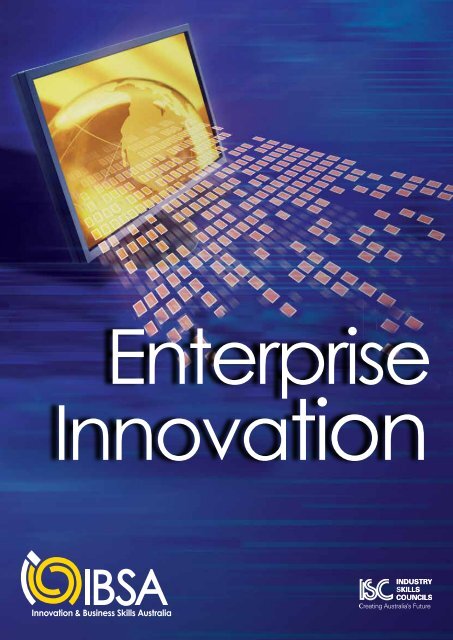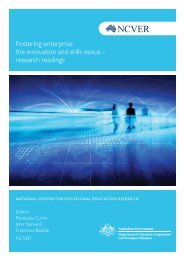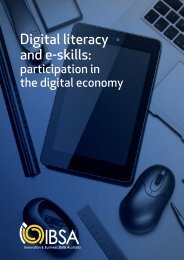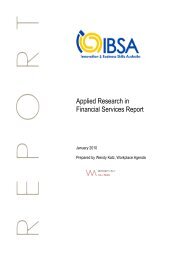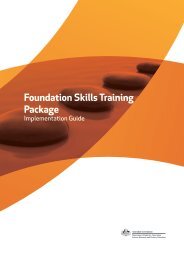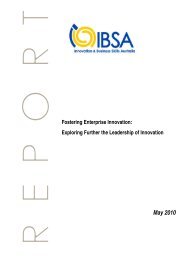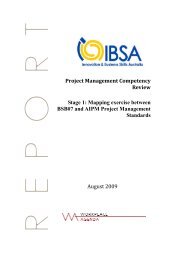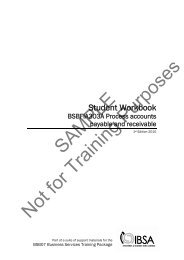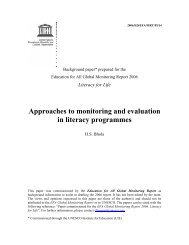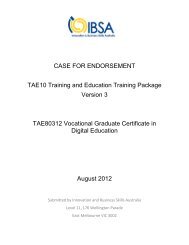Looking Forward - Innovation & Business Skills Australia
Looking Forward - Innovation & Business Skills Australia
Looking Forward - Innovation & Business Skills Australia
You also want an ePaper? Increase the reach of your titles
YUMPU automatically turns print PDFs into web optimized ePapers that Google loves.
Enterprise<br />
<strong>Innovation</strong>
<strong>Looking</strong> <strong>Forward</strong>: Enterprise <strong>Innovation</strong><br />
<strong>Innovation</strong> is at the heart of national productivity gains. It is an ongoing<br />
process that requires more research into the roles of business leaders,<br />
government and services providers. The <strong>Innovation</strong> and <strong>Business</strong> <strong>Skills</strong><br />
<strong>Australia</strong> (IBSA) Board has positioned innovation as a central focus in<br />
our collaborations with enterprises, training providers, governments and<br />
other organisational stakeholders.<br />
John Vines,<br />
OAM Chair IBSA<br />
In the spirit of sharing and leading by example, IBSA, in consultation<br />
with the <strong>Business</strong> Council of <strong>Australia</strong>, the <strong>Australia</strong>n Industry Group,<br />
the <strong>Australia</strong>n Council of Trades Unions, the <strong>Australia</strong>n Chamber of<br />
Commerce and Industry, the Department of <strong>Innovation</strong>, Industry,<br />
Science and Research and the Department of Education, Employment<br />
and Workplace Relations, held an Enterprise <strong>Innovation</strong> Summit at<br />
Parliament House Canberra in June 2009.<br />
Officially opened by The Hon Dr Craig Emerson MP, Minister for<br />
Competition Policy and Consumer Affairs; Minister for Small <strong>Business</strong>,<br />
Independent Contractors and the Service Economy; Minister Assisting the<br />
Finance Minister on Deregulation, the summit explored ideas, problems<br />
and solutions with approximately 60 leaders of enterprise innovation,<br />
industry associations and the tertiary sector. The starting premise was<br />
that there is already a compelling case for greater engagement in<br />
enterprise innovation to increase national productivity, prosperity and<br />
social well-being.<br />
Professor Roy Green,<br />
Faculty of <strong>Business</strong> UTS<br />
The Society for Knowledge Economics (SKE) was commissioned by IBSA<br />
to write a brief background paper for participants outlining the current<br />
state of enterprise innovation in <strong>Australia</strong>. The paper set out some<br />
perspectives on innovation and the ways in which leadership, culture<br />
and management within organisations contribute to innovation and<br />
productivity.<br />
The Hon Richard Marles MP addressed the summit, emphasising the<br />
critical relationship between innovation and enterprise and national<br />
productivity.<br />
Speakers, panels and participants focused on international and<br />
domestic responses to ways enterprise leadership can create a culture<br />
of innovation in workplaces, enabling greater productivity through<br />
different forms of innovation.<br />
Mr Steve Vamos,<br />
Society for Knowledge<br />
Economics<br />
Drawing together the threads and energising the group were<br />
commentators Professor Roy Green, Dean Faculty of <strong>Business</strong>, University<br />
of Technology, Sydney (UTS) and Reviewer of the <strong>Australia</strong>n Textile,<br />
Clothing and Footwear Industries, and Mr Steve Vamos, President,<br />
Society for Knowledge Economics (SKE). Focus was on innovation as<br />
it relates to international and domestic productivity and especially its<br />
critical role in <strong>Australia</strong>’s recovery and growth. Discussion highlighted<br />
innovation leadership including models of enterprise intervention and<br />
support, workplace engagement, and organisational learning and<br />
development strategies.<br />
‘<strong>Innovation</strong> is core to everything we do. Employees need to have a significant financial interest in the<br />
outcome of the business.’ Lynette Mayne, Work Wear World.
‘Solve problems, reduce risk, make money.’ Alex Blauensteiner, <strong>Australia</strong>n Institute for Commercialisation.<br />
The international guest speaker, sponsored by Enterprise Connect and<br />
the Department of <strong>Innovation</strong>, Industry, Science and Research, was<br />
Ms Bernie Cullinan, CEO of Clarigen, a company providing outsourced<br />
solutions for companies in the small and medium enterprise sector<br />
in Ireland. The Celtic Tiger’s rise, fall and continuing story provided a<br />
superb case study for participants.<br />
Keynote presenter was Mr Hutch Ranck, Managing Director, DuPont<br />
<strong>Australia</strong> and New Zealand and Chair of <strong>Business</strong> Council of <strong>Australia</strong>’s<br />
Education, <strong>Skills</strong> and <strong>Innovation</strong> Task Force. His focus on impediments<br />
to innovating and the relationship between universities and business in<br />
bringing ideas to commercialisation, generated much discussion.<br />
Ms Bernie Cullinan,<br />
CEO Clarigen<br />
The aim of the summit was to contribute to developing a new agenda<br />
around leadership and management of <strong>Australia</strong>n enterprises, to<br />
improve the skills of our workforce more broadly, and to increase<br />
<strong>Australia</strong>’s capacity and capability for innovation. Panel speakers<br />
provided short presentations and case studies from <strong>Australia</strong> and<br />
internationally as a stimulus for wider participants’ discussion:<br />
• Mr Bruce Biltoft, Managing Director, Memcor <strong>Australia</strong> Pty Ltd<br />
• Mr Geoff Fary, Assistant Secretary, ACTU<br />
• Dr Tony Golsby-Smith, CEO and Founder of 2nd Road<br />
• Mr Grant Kearney, CEO, <strong>Innovation</strong>Xchange and IXC<br />
International<br />
• Ms Narelle Kennedy, Chief Executive, <strong>Australia</strong>n <strong>Business</strong><br />
Foundation and Member of the Cutler Review of the National<br />
<strong>Innovation</strong> System<br />
Mr Hutch Ranck,<br />
Managing Director,<br />
DuPont <strong>Australia</strong> and<br />
New Zealand and Chair<br />
of <strong>Business</strong> Council<br />
of <strong>Australia</strong>’s (BCA)<br />
Education, <strong>Skills</strong> and<br />
<strong>Innovation</strong> Task Force<br />
• Ms Lynette Mayne, Executive Chair, Work Wear World<br />
• Mr Tony Pensabene, Associate Director, Economics and<br />
Research, <strong>Australia</strong>n Industry Group<br />
• Mr Philip Williamson, CEO, Intelledox.<br />
The summit proposed a number of practical steps to foster innovation<br />
and invest in the policies and practices that will generate the next round<br />
of productivity gains. This publication is the first step for IBSA in drawing<br />
together the ideas which included:<br />
• investigating mechanisms for developing and providing resources<br />
that can be disseminated to organisations wishing to improve<br />
their skills in innovation<br />
• identifying methods for developing workplace leadership<br />
capabilities and employee engagement for innovation and<br />
collaboration<br />
• promotion of a greater understanding of the relationship between<br />
entrepreneurship, innovation and risk.<br />
'The ACTU has a simple<br />
position regarding change<br />
at the workplace level:<br />
Unions need to be actively<br />
involved in genuine<br />
change processes to assist<br />
<strong>Australia</strong> to become more<br />
sustainably competitive.<br />
We seek to work<br />
constructively with<br />
employers and governments<br />
to go up market and up<br />
value.'<br />
Geoff Fary, ACTU.<br />
‘Look to the whole organisation to innovate with ideas, not just the scientists ... Think globally,<br />
especially for technologies that can serve global markets.’ Bruce Biltoft, Memcor.
The Enterprise <strong>Innovation</strong> paper prepared by SKE for the IBSA Enterprise<br />
<strong>Innovation</strong> Summit on 22 June 2009 Parliament House Canberra, provides<br />
some perspectives on innovation and the ways in which leadership,<br />
culture and management within organisations contribute to innovation<br />
and productivity. The paper is summarised below.<br />
Why should enterprise innovation capability be important to us during<br />
the most severe global financial crisis for seventy years<br />
First, the crisis indicates that change is needed and as such allows,<br />
indeed calls for the consideration of alternative ways of doing things.<br />
Second, it is clear that economies that reorganise themselves and seek<br />
new opportunities for growth will be the ones to recover fastest from the<br />
crisis.<br />
If we are to address the opportunities that lie in emerging knowledge<br />
based industries and increasing international competition, then the need<br />
to improve productivity and innovation performance are significant<br />
challenges and opportunities that demand change in the way our<br />
workplaces are led and managed.<br />
The <strong>Australia</strong>n Bureau of Statistics shows that innovation is about<br />
three things, including the delivery of new or significantly improved: 1)<br />
goods and services; 2) operational processes; and/or 3) organisational<br />
processes.<br />
According to the recent White Paper from Senator Kim Carr ‘Powering<br />
Ideas’, in the last eight years <strong>Australia</strong> has slipped from 5th to 19th in the<br />
World Economic Forum’s Global Competitiveness Index. The <strong>Australia</strong>n<br />
Bureau of Statistics’ 2006-07 survey of innovation in <strong>Australia</strong> finds that<br />
of the 708,000 businesses surveyed only 260,544 (or 36.8%) are ‘active<br />
innovators’.<br />
The participation rates for innovation within business do appear to rise as<br />
organisations get bigger: 30.6% of businesses with 0-4 people innovate;<br />
44.7% of businesses with 5-19 people; 55.7% of businesses with 19-200<br />
people and finally; 66.1% of businesses with over 200 people.<br />
The World Economic Forum’s Global Competitiveness Report (2008-09)<br />
indicates that <strong>Australia</strong> lags behind in terms of business management<br />
and innovation capabilities at the workplace level. For example, in the<br />
‘capacity for innovation’ category, <strong>Australia</strong> ranks number 20 whilst<br />
‘We need to build great organisations in this country, and without wanting to throw away the word ‘innovation’<br />
we do need to broaden our vision beyond that word. We need a broader vision and we need to create<br />
inspirational workplaces. The missing link is design.’ Tony Golsby-Smith, 2nd Road.<br />
‘Enterprise Ireland is investing heavily in leadership development, starting with the ICT sector. Participation in the<br />
program has resulted in many of the companies strengthening significantly through an increased innovative<br />
capability and the development of the cultures within the organisation to exploit the resulting opportunities fully.’<br />
Bernie Cullinan, Clarigen, Ireland.
‘Five principles of innovation: Create discipline; Study the trends; Listen to customers; Active<br />
networking; Manage failure and cut losses early.’ Hutch Ranck, DuPont <strong>Australia</strong> and New Zealand.<br />
Germany comes in at number one, with the Scandinavian countries<br />
following close thereafter. Furthermore, on the ‘sophistication of<br />
company operations and strategy’, <strong>Australia</strong> ranks number 26 (the USA<br />
is number one). A number of reasons for this are suggested including<br />
culture and leadership styles that can inhibit and/or enable knowledge<br />
sharing and innovation from taking place.<br />
Yet there are reasons for optimism. What are the raw materials within<br />
the human capital of <strong>Australia</strong> that we can build on to create a better<br />
future And what might be some of the barriers inside business that<br />
need to be removed for innovation to lift<br />
The paper examines the link between innovation and productivity<br />
at the workplace level. It also points out international trends and<br />
developments aimed at lifting enterprise innovation rates and hence<br />
productivity. Finally, a potential agenda is put forward for improving<br />
enterprise innovation in <strong>Australia</strong>.<br />
Undoubtedly, the success of <strong>Australia</strong>’s national innovation system will<br />
increasingly depend on the quality of leadership and management<br />
at the organisational level. As workplaces become more flexible and<br />
responsive in a changing competitive environment, the emphasis<br />
of economic reform will need to evolve to address the leadership,<br />
culture and management of <strong>Australia</strong>n organisations, as well as the<br />
infrastructure and programs required to support the development of<br />
innovative capabilities within organisations.<br />
The IBSA National <strong>Innovation</strong> Summit provides an opportunity to<br />
contribute to the development of an agenda that seeks to increase<br />
<strong>Australia</strong>’s innovation participation rates which in turn increases national<br />
productivity, prosperity and sustainability. It is an opportunity to identify<br />
what needs to be done to build a better future, better companies,<br />
more engaged workforces, and more productive and innovative<br />
organisations with skilled and capable people. To identify what each<br />
one of us, both individually and as part of our respective organisations,<br />
can do. It is a chance to challenge orthodoxies and vested interests<br />
that have resulted in our present situation – a chance to be heard and<br />
make a contribution.<br />
• In hindsight, we did not focus on the excessive role construction was playing in the rapid growth of Ireland’s<br />
GDP to the extent we should have.<br />
• A key strategy review in 2004 recommended a much stronger framework for collaboration on research<br />
between Government, Industry and University (SFI).<br />
• Research must have a commercial focus.<br />
• Provision of financial incentives and training to companies to create capability should focus on all staff to<br />
become innovative in their area.<br />
• Focus on leadership development has delivered greater results in innovation.<br />
Bernie Cullinan, Clarigen, Ireland.
‘At the heart of productivity gains for <strong>Australia</strong> is the ability to assist companies to transform. At the heart of transforming<br />
business is the need to respond to customer needs. The “miraculous alchemy of innovation takes place close to the customer”.’<br />
Narelle Kennedy, <strong>Australia</strong>n <strong>Business</strong> Foundation.<br />
IBSA Enterprise <strong>Innovation</strong> Summit Statement<br />
A summit meeting conducted on June 22 2009 by <strong>Innovation</strong> and<br />
<strong>Business</strong> <strong>Skills</strong> <strong>Australia</strong> (IBSA) suggested a number of practical steps<br />
to foster innovation which IBSA has further refined into the following<br />
statement.<br />
Acknowledging the government’s major policy agendas as articulated<br />
in Powering Ideas: An <strong>Innovation</strong> Agenda for the 21st Century, and<br />
the infrastructure investment associated with Building the Education<br />
Revolution to enhance future skills and knowledge capabilities,<br />
innovation remains at the heart of driving national productivity gains. It<br />
is not an end in itself, but is a process that delivers economic and social<br />
benefits to individuals and society as a whole. It enables organisations to<br />
transform their capabilities. It is not only embodied in goods and services,<br />
but includes a broader range of activity including business processes<br />
and practices. <strong>Innovation</strong> can come from markets and customers as<br />
well as from research and development.<br />
<strong>Australia</strong> must invest now in the policies and practices that will generate<br />
the next round of productivity gains. Failure to do so will see <strong>Australia</strong> fall<br />
in the rankings in terms of global competiveness with a resultant decline<br />
in the overall economy.<br />
Based on the summit and in discussions with parties involved in the<br />
<strong>Innovation</strong> Agenda, as part of its core role as an Industry <strong>Skills</strong> Council,<br />
IBSA will advance the following ideas:<br />
► Leadership and Workplace Productivity research to promote the<br />
interconnectedness of innovation, skills formation, leadership and<br />
productivity in the workplace, and:<br />
• Consider the key factors that influence innovation in the<br />
workplace and the roles of government, business leaders and<br />
services providers.<br />
• Identify strategies based on the Cutler report, Venturous <strong>Australia</strong>:<br />
building strength in innovation, and the Government’s response,<br />
which support effective collaboration mechanisms to underpin<br />
and support innovation in enterprises.<br />
• Investigate mechanisms for developing and providing resources<br />
for dissemination to organisations wishing to improve their skills<br />
in leadership and employee engagement in innovation and<br />
collaboration, while creating a greater understanding of the<br />
rewards.<br />
• Focus on enhancement of networking and mentoring mechanisms<br />
and opportunities relating to collaboration and innovation, both<br />
domestically and internationally.<br />
‘R & D is a small part of taking product to market. <strong>Australia</strong> is immature and it is hard for<br />
the government to invest in technology software. We need strategies other than tax<br />
rebates. To create an environment of innovation and entrepreneurship, ask how we can<br />
shift that to support radical and different technology.’<br />
Phillip Williamson, Intelledox.
‘Industry leaders, researchers and policy makers are becoming increasingly aware that collaboration, particularly at an<br />
international level, is now more vital than ever before.’ Grant Kearney, <strong>Innovation</strong>Xchange.<br />
'We are told that the global financial crisis changes everything. But for skills and innovation, it changes nothing.<br />
Our policy challenge is to link short-term recovery to longer term competitive advantage for firms and organisations ...<br />
Increasingly around the world, innovation is not just about science and technology but organisational innovation,<br />
including new business models, systems integration and new approaches to design and branding.' Roy Green, UTS.<br />
IBSA will outline the case for the Government’s consideration<br />
of research focusing on sharing good practice with a view to<br />
encouraging the uptake of innovative practices in enterprises.<br />
► Within the context of looking at methods for developing workplace<br />
leadership capabilities, skills development and employee<br />
engagement for innovation and collaboration, promoting a greater<br />
understanding of risk, innovation and entrepreneurship expressed by<br />
start up firms.<br />
IBSA will undertake work examining the links between risk, innovation<br />
and entrepreneurship.<br />
► Undertaking work to better understand the nature of young <strong>Australia</strong>n<br />
entrepreneurs and their representation in small business.<br />
IBSA will conduct research into the nature of young <strong>Australia</strong>n<br />
entrepreneurs by examining barriers and incentives which affect<br />
their decision-making processes.<br />
► Development of a National Industry Charter for <strong>Innovation</strong> and<br />
Leadership, incorporating industry, unions, government and<br />
education and training, including the assessment of the appetite for<br />
innovation and collaboration of beneficiary organisations.<br />
IBSA will conduct discussions with industry parties within the context<br />
of the Government’s paper, Powering Ideas: an innovation agenda<br />
for the 21st Century, about the development of an industry endorsed<br />
charter on innovation.<br />
‘How do you measure the quality of non-financial assets and the performance of managers in developing their Human<br />
Capital Performance in this case is much more than just the numbers. Performance is about managing stakeholder<br />
expectations and putting in place the leadership, culture and management practices that deliver on their expectations.<br />
Building sustainable organisations that innovate, demands an approach that connects people in the organisations to<br />
opportunity and the expectations of stakeholders.’<br />
Steve Vamos, SKE.
Checklist for implementing an innovative culture<br />
1. Celebrate, recognise and reward small improvements in product, process or service, as well<br />
as the major breakthrough innovations.<br />
2. Encourage a facilitative management or leadership style and encourage employees to<br />
think about improvement in terms of product, process or service (or combinations of these).<br />
Quality circles or similar structures can support this leadership style.<br />
3. Provide opportunities for employees to network both internally and externally through job<br />
rotation, cross-functional teams and through attendance at industry functions.<br />
4. Continually benchmark the enterprise against others in the industry sector to develop a<br />
better understanding of the comparative performance of the enterprise and gather ideas<br />
and stimulus for innovation.<br />
5. Develop a global perspective and an understanding of global influences on the industry<br />
sector to prepare the enterprise for responding to opportunities and possible threats.<br />
6. Review the skill base of employees in the enterprise, and identify the skills that will need to be<br />
developed to implement an innovation culture.<br />
7. Develop an appropriate risk profile. Encouragement for innovation needs to come from the<br />
top. Boards should set clear parameters for innovation as part of the governance of the<br />
organisation so that individuals and teams have known boundaries within which to innovate.<br />
8. Seek opportunities for collaboration. While most large companies have closed loop<br />
innovation systems, medium and smaller companies are increasingly seeking to collaborate<br />
to deliver on complex projects. Collaboration can occur on a local or global basis.<br />
Better <strong>Business</strong> Through <strong>Innovation</strong><br />
<strong>Innovation</strong> and <strong>Business</strong> <strong>Skills</strong> <strong>Australia</strong> (IBSA) is the Industry skills council with responsibility for the following industry<br />
sectors:<br />
• <strong>Business</strong> Services<br />
• Cultural & Related Industries<br />
• Education<br />
• Financial Services<br />
• Information & Communication Technologies<br />
• Printing & Graphic Arts.<br />
IBSA’s mission is to build the capability, professionalism and innovative capacity of the <strong>Australia</strong>n workforce. Bringing<br />
together fresh thinking and sound research, IBSA fosters the support and collaboration of informed people from across<br />
industry, education and training and research sectors. IBSA works with industry to incorporate innovation and creativity<br />
competencies in nationally endorsed vocational education training units, skills sets and qualifications, and develops<br />
business workforce development tools.<br />
IBSA’s Enterprise <strong>Innovation</strong> Summit in 2009 brought together global perspectives to identify and explore key areas for<br />
innovation practices to enhance enterprise productivity and success.<br />
e reception@ibsa.org.au t +61 3 9815 7000<br />
w www.ibsa.org.au f +61 3 9815 7001<br />
Level 11, 176 Wellington Pde, East Melbourne VICTORIA 3002 AUSTRALIA


